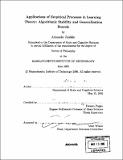Applications of empirical processes in learning theory : algorithmic stability and generalization bounds
Author(s)
Rakhlin, Alexander
DownloadFull printable version (5.325Mb)
Other Contributors
Massachusetts Institute of Technology. Dept. of Brain and Cognitive Sciences.
Advisor
Tomaso Poggio.
Terms of use
Metadata
Show full item recordAbstract
This thesis studies two key properties of learning algorithms: their generalization ability and their stability with respect to perturbations. To analyze these properties, we focus on concentration inequalities and tools from empirical process theory. We obtain theoretical results and demonstrate their applications to machine learning. First, we show how various notions of stability upper- and lower-bound the bias and variance of several estimators of the expected performance for general learning algorithms. A weak stability condition is shown to be equivalent to consistency of empirical risk minimization. The second part of the thesis derives tight performance guarantees for greedy error minimization methods - a family of computationally tractable algorithms. In particular, we derive risk bounds for a greedy mixture density estimation procedure. We prove that, unlike what is suggested in the literature, the number of terms in the mixture is not a bias-variance trade-off for the performance. The third part of this thesis provides a solution to an open problem regarding the stability of Empirical Risk Minimization (ERM). This algorithm is of central importance in Learning Theory. (cont.) By studying the suprema of the empirical process, we prove that ERM over Donsker classes of functions is stable in the L1 norm. Hence, as the number of samples grows, it becomes less and less likely that a perturbation of o(v/n) samples will result in a very different empirical minimizer. Asymptotic rates of this stability are proved under metric entropy assumptions on the function class. Through the use of a ratio limit inequality, we also prove stability of expected errors of empirical minimizers. Next, we investigate applications of the stability result. In particular, we focus on procedures that optimize an objective function, such as k-means and other clustering methods. We demonstrate that stability of clustering, just like stability of ERM, is closely related to the geometry of the class and the underlying measure. Furthermore, our result on stability of ERM delineates a phase transition between stability and instability of clustering methods. In the last chapter, we prove a generalization of the bounded-difference concentration inequality for almost-everywhere smooth functions. This result can be utilized to analyze algorithms which are almost always stable. Next, we prove a phase transition in the concentration of almost-everywhere smooth functions. Finally, a tight concentration of empirical errors of empirical minimizers is shown under an assumption on the underlying space.
Description
Thesis (Ph. D.)--Massachusetts Institute of Technology, Dept. of Brain and Cognitive Sciences, 2006. Includes bibliographical references (p. 141-148).
Date issued
2006Department
Massachusetts Institute of Technology. Department of Brain and Cognitive SciencesPublisher
Massachusetts Institute of Technology
Keywords
Brain and Cognitive Sciences.